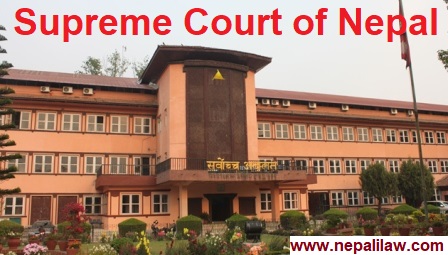The Supreme Court has set principle that a step-son cannot claim the right to inherit property even if he has a married daughter.
The Supreme Court has reversed the decision of the then appellate court Butwal in a case related to a childless property dispute in Rupaulia, Nawalparasi.
A full bench of Justices Sapna Pradhan Malla, Prakash Kumar Dhungana and Hari Prasad Phunyal ruled that it would be discriminatory if the daughter could not be adopted as she was married.
The district and the then appellate court have decided to give the share saying that it is a law that a daughter who is married while having a son on the stepmother’s side is not allowed to take the share.
The full text of the decision made by the Supreme Court five months ago has been brought on Tuesday. “If the daughter is to be evicted from the process of childlessness by being married, her own children will also be excluded from the mother’s custody by being a married daughter,” the Supreme Court said in its judgment.
The controversy was like this
Shankar Tharu, son of Buddhiram Tharu of Rupauliya, Nawalparasi, died. Of his two wives, the eldest is Sonia Devi and the youngest is Saguni. Sonia’s eldest son Narayan Prasad Tharu and youngest Saguni’s only daughter Indra Kumari. Indra Kumari married Tej Narayan Tharu in 2042 BS.
Shankar Tharu’s property was jointly registered in the names of Saguni and Narayan Prasad after his death. After Saguni’s death in 2063 BS, Narayan made all the property in his name. After that, he refused to transfer the name in the name of Indra Kumari. Harendra Kumar Chaudhary, son of Indra Kumari, had filed a petition seeking to uphold Saguni’s right to the joint registered land.
The Nawalparasi district court had ruled that his claim was not sufficient. The then appellate court Butwal also ruled that the claim was not sufficient.
However, the apex court reversed the verdict and ruled that the right of the deceased Saguni Tharu would be upheld in half of the disputed land. Narayan Prasad Tharu had again filed a case against the earlier decision of the Supreme Court.
The position of the Supreme
The Supreme Court has said, “A widow who is not a son of the deceased but a daughter-in-law gets a child like a son.” According to the Aputali Act, it is mentioned that the rightful owner gets it.
The Supreme Court claims that the law has set a clear priority order for claiming in the case of a child. Therefore, the Supreme Court has ruled that there is no dispute between Sagunidevi’s daughter and her step-son.
Article 18 of the Constitution guarantees that men and women will not be discriminated against on the basis of married and unmarried under the right to equality.
“The use of common law shall not discriminate on the basis of origin, religion, caste, caste, sex, physical condition, disability, health status, marital status, pregnancy, economic status, language or region, ideological belief or any other such basis,” the constitution said. All children will have equal rights to ancestral property without gender discrimination. Under women’s rights, every woman will have equal racial rights without gender discrimination. ‘
Anshabanda and Aputali are mentioned in separate palaces. ‘Ansh and Aputali do not seem to be the same. If you look at the relationship in part, it does not mean that there should be a relative in Aputali. The person taking care of it can also get infertility, ‘the decision states.
‘As long as the husband, wife, son or son of the deceased dies, the daughter does not get childless. If there is no such person, the daughter will have a child. If the daughter is a virgin, she gets two parts and if she gets married, she gets one part, so the Supreme Court has said, “If there is no daughter, the heirs who live together and if not, the other heirs get the part.”
In case of father or son living together or separately, if the son dies first and the father dies later, the stepdaughter will get it, while if the father has both daughter and son’s daughter, there is a legal provision to share.
The Supreme Court has stated in the judgment that if all the other sharecroppers living together die and have children, then the daughter of all the sharecroppers will be allowed to share according to the enactment.
‘The property in the joint name of the two shareholders seems to have an equal share of the step-son and the step-mother Sagunidevi. Holding property in a joint name does not mean transferring one’s rights to another person, ‘said the Supreme Court.
 Nepali Law A complete legal information portal
Nepali Law A complete legal information portal

